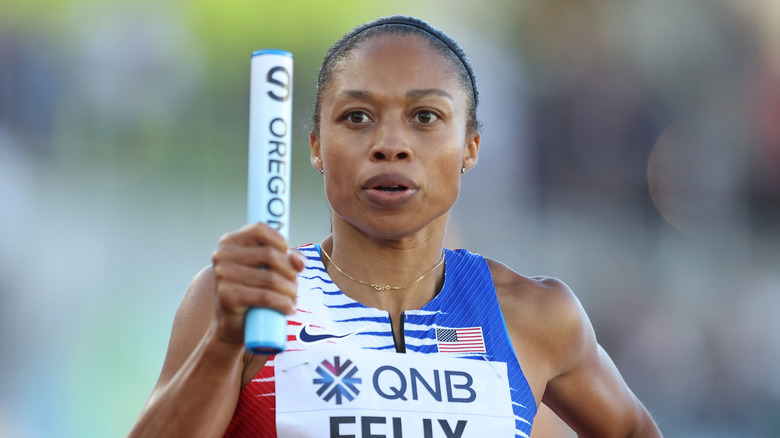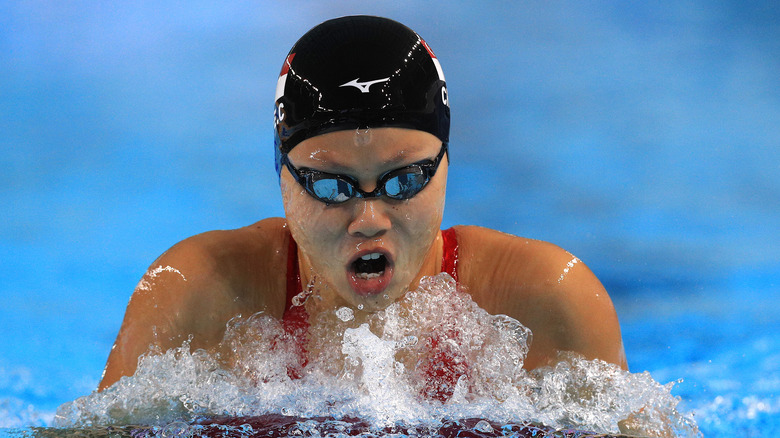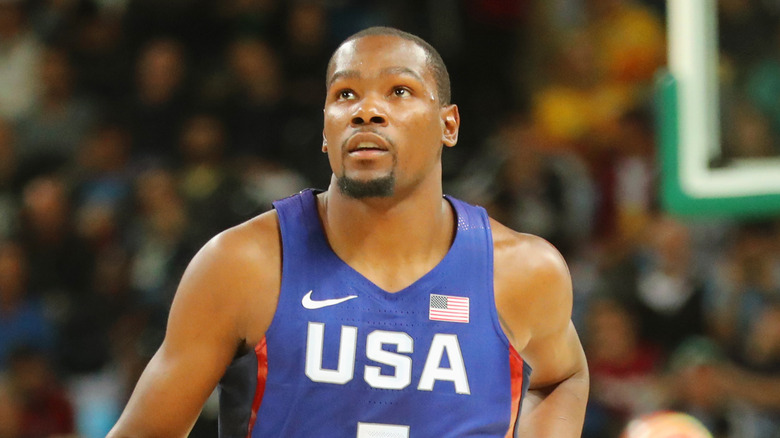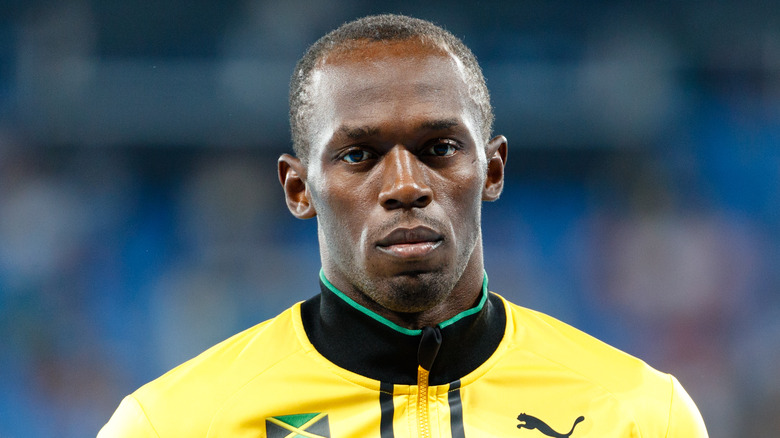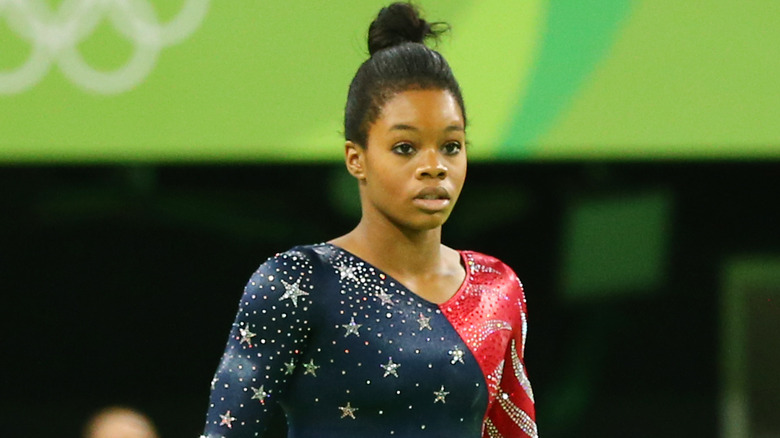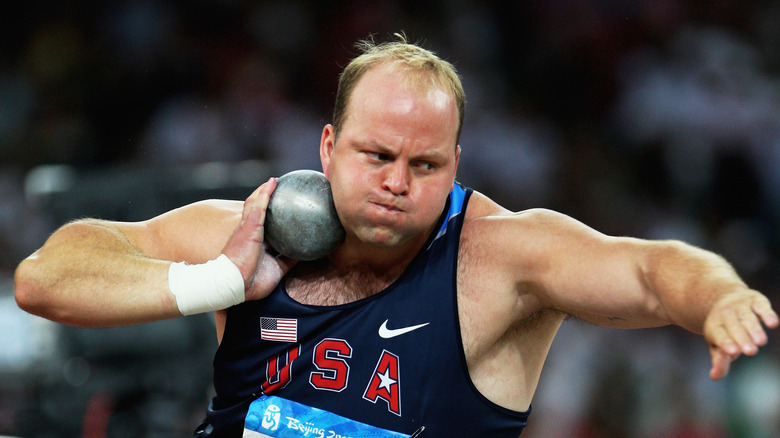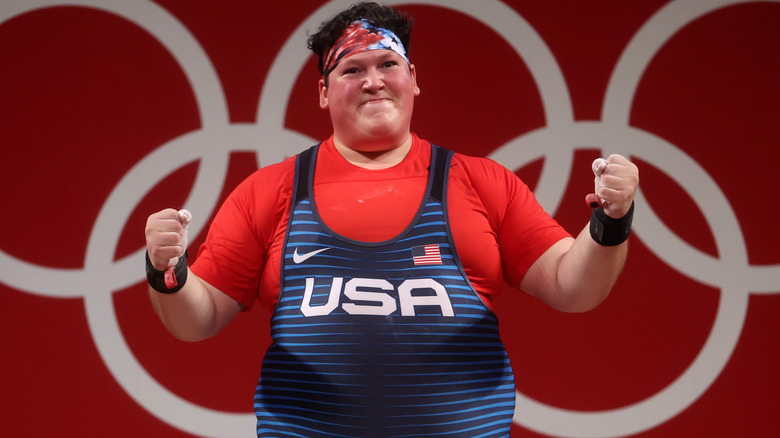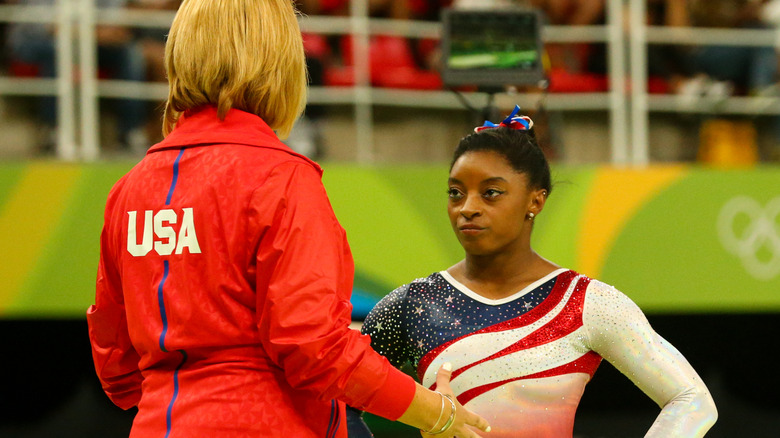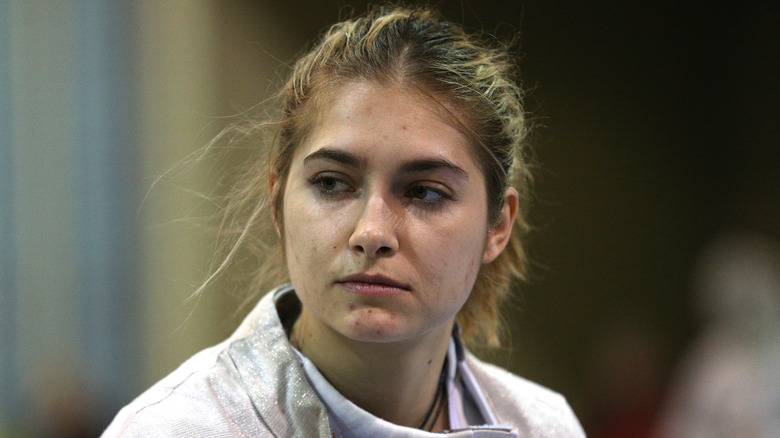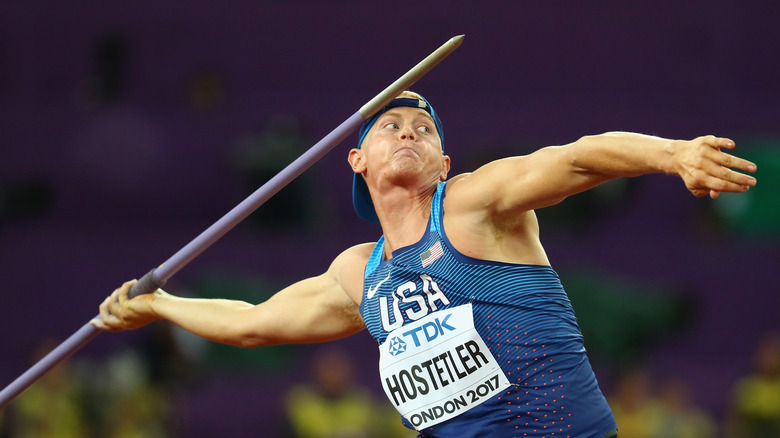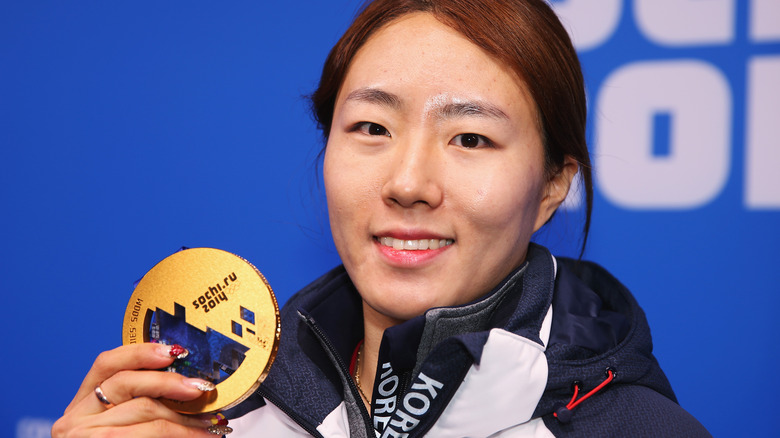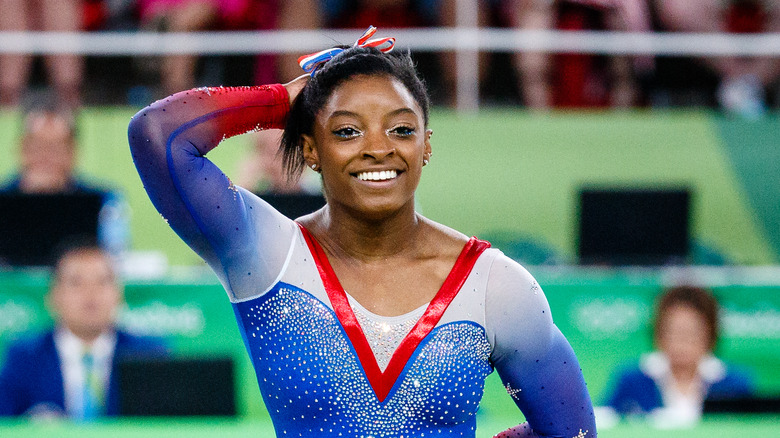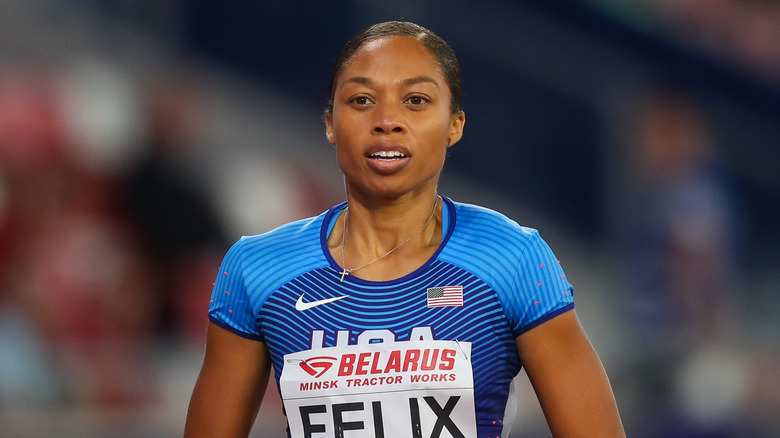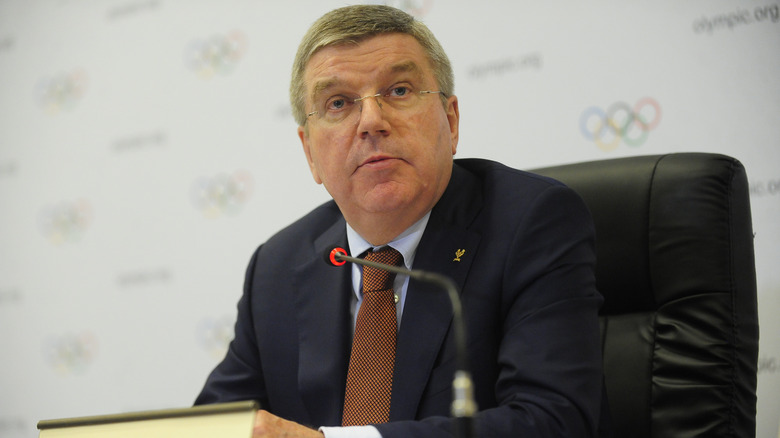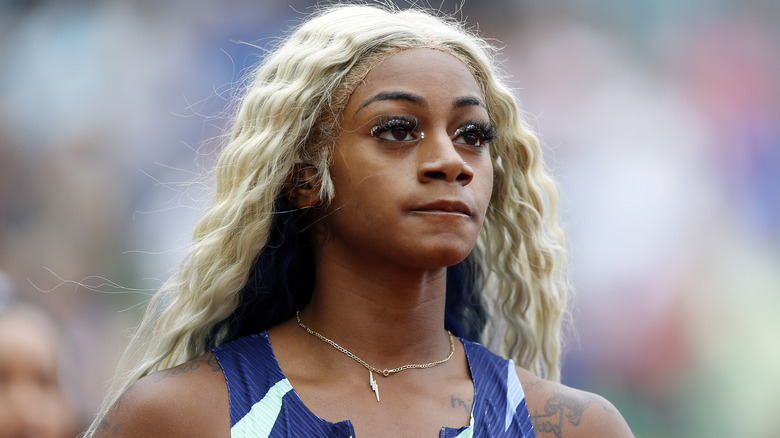How Much Money Olympic Athletes Really Make
Long before professional athletes could compete at the Olympic Games, the widely broadcast holy grail of track and field was a beginners' affair. The love of the game preceded monetary compensation and players who so much as received a dollar prior to the Olympics faced dire consequences. In 1955, the late fifth president of the Internation Olympic Committee, Avery Brundage said, "We can only rely on the support of those who believe in the principles of fair play and sportsmanship embodied in the amateur code in our efforts to prevent the Games from being used by individuals, organizations, or nations for ulterior motives," per CNN. In layman's terms? He wanted to keep the games free from being commercialized, and thus free from any potential corruption or abuses that can come with offering financial reward.
The enforcement of this stance had earlier led to the publicized 1913 revoking of two gold medals by multi-skilled Native American athlete Jim Thorpe, who'd received remuneration as a baseball player for North Carolina's Rocky Mount club. Thorpe's titles were eventually reinstated posthumously.
Following the end of Brundage's reign, the Olympics took a commercial tone that has consistently brought the world to a standstill once every four years. With it comes the wealth of Olympic athletes, which runs the spectrum from amateurs with next to nothing to professional stars making millions. From medal bonuses to brand endorsements, read on to find out who has the cash to compete and who had to wager it all for a shot at Olympic glory.
Singapore is the leading country in medal bonus payouts
Arguably the easiest way for Olympic athletes to make money at the actual Games is to bring home a gold, silver, or bronze medal. Many countries, the United States included, provide payouts to Olympians for the medals they win. In 2012, it was reported that Italy was the country with the world's highest payout, offering its athletes $182,400 for each gold medal. Russia was runner-up with a $135,000 golden bonus, and France placed third at $65,200 per gold. Great Britain offered no medal bonus to its winning athletes.
A decade later, the baton was passed to Singapore, leading the pack with a whopping $737, 000 reward for its gold champions, $369,000 paid to silver medalists, and $184,000 for bronze. Kazakhstan and Malaysia took the second and third places respectively.
The United States government does not technically pay its athletes for Olympic hardware. Instead, the United States Olympic & Paralympic Committee (USOPC) foots the bill. The committee reportedly paid Olympians $25,000 for gold, $15,000 for silver, and $10,000 for bronze medals in 2016, according to Forbes. The government used to tax those bonuses prior to Rio 2016. Additionally, as of 2021, Insider claimed that exceptional Olympians were said to receive a monthly allowance as low as $300, and as high as $4000.
Kevin Durant's reign as top income athlete continues
When Forbes released a list of the highest-paid athletes competing in the 2016 Summer Games in Rio de Janeiro, Brazil. NBA star Kevin Durant's impressive income topped the list. The small forward reportedly made a not-so-small $56.2 million between June 2015 and June 2016. Durant was also a member of the 2012 gold medal U.S. Olympic basketball team, so he's definitely got the stats to back up the cash.
As of 2022, Durant's luck had not run out. Yet again, the Phoenix Suns player and two-time gold medalist emerged as one of Forbes' top-paid sports stars, having raked in a reported $92.1 million that year. Durant is a sharp-witted businessman, and $50 million of that sum was earned off the court. The star has put his earnings to good use as the co-founder of the venture capital firm Thirty-Five Ventures,whose subsidiaries include the entertainment outlet, Boardroom. He is also a Nike partner — a role that nets him around $28 million a year.
His strategy, he revealed to Forbes, is minting as many millions as he can through his image. "The view of basketball and the NBA has widened so much that it puts us in a lot of different rooms ... owing us to take advantage of who we are," the two-time NBA champion voiced.
Usain Bolt fell victim to a retirement scam
If you're a track and field athlete, you're likely making peanuts — unless you're Usain Bolt. The record-breaking Olympian from Jamaica earned $20.3 million in prize money and bonuses between July 2015 and July 2016, a big chunk of which came from his $10 million-a-year collaboration with Puma.
Not all lightning-fast runners are so lucky. According to a 2012 report from the Track and Field Athletes Association (via CNN Money), 50 percent of its athletes who ranked in the top 10 in the United States in their event made less than $15,000 annually off the sport, including sponsorship, grants, and prize money. In July 2016, two-time Olympian runner Nick Symmonds told the International Business Times, "I know Olympic medalists who live below the poverty line." In 2020, sports agent John Nubani told USA Today Sports that most track and field stars were reliant on competition prize money which could be as high as $10,000 for a top spot but just $1,000 for finishing eighth.
While Bolt's success makes for a small percentage of athletes who have made a killing, the security of his finances is at stake, given reports that he'd fallen victim to an alleged scam by the Jamaican company Stocks & Securities Limited. Out of $12 million in savings, Bolt had a meager $12,000 left. Speaking to Television Jamaica, Bolt said of his predicament, "I leave the matter in my lawyer's hand[s] ... I'm just trying to focus on my family and try[ing] not to think too much about it because it's a stressful situation."
Gabby Douglas, a Cinderella story
Gabby Douglas may have secured millions in endorsement deals following the 2012 Summer Olympics in London, but leading up to that moment, life was hard for her family. According to The Washington Post, Douglas's mother, Natalie Hawkins was forced to go on disability and could not even pay the family's water bill in 2009. Two years later, Hawkins was unable to accompany her daughter to Tokyo to watch her win gold at the World Championships. She also reportedly filed for bankruptcy months before the London Games in 2012 after struggling to pay for Douglas' training, per Daily Mail.
Fortunately, the effects of Douglas' Olympic glory turned things around for her family. She may have entered the Games below the poverty line, but she was one of the fortunate Olympians to emerge as a millionaire. After Douglas' newfound publicity, she released a December 2012 memoir dubbed "Grace, Gold, and Glory," and a follow-up tome, "Raising the Bar," suited for a younger audience looking for tips on how to seize their dreams.
A 2016 tour of Douglas' Los Angeles home with US Weekly showcased her family's much more comfortable lifestyle, featuring a display case for her medals and an organized closet, a far cry from the life of struggle they once endured.
Adam Nelson auctioned himself on eBay
United States shot put silver medalist Adam Nelson was lacking sponsors and struggling to make ends meet after the 2004 Summer Games in Athens, Greece, so he got creative. Nelson decided to sell himself on eBay. He offered a one-time spokesmanship for the winning bidder and an additional month of logo visibility. The auction worked! Nelson launched a $12,000 deal with MedivoxRX Technologies to advertise Rex, The Talking Bottle, an aid for senior citizens and blind people who have trouble reading medicine labels.
However, he isn't the only one to have taken the auctioning route. Back in 2012, track star Nick Symmonds sold the rights to a temporary tattoo space on his skin, which he eventually sold to a Milwaukee firm for $11,000. Four years later, he took the same approach by creating a temporary advertising slot on the skin of his right shoulder, which he made available for the highest bidder on eBay. T-Mobile acquired rights to the temporary nine square inches spot for $21,800. Speaking to ESPN, he explained, "The sale of my skin is just another example of an athlete taking control of the valuable space that we own. Allowing us to better market ourselves will inject tens of millions of dollars into the sport and help professional runners."
Sarah Robles survived on food banks and donations
Sarah Robles has been hailed as one of the strongest women in America, and she definitely earned that title with a seventh-place finish in weightlifting's top weight class at the 2012 Olympics. However, her path to the London Games was not paved with fame and fortune. Robles trained for the Olympics by supplementing her $400 monthly stipend from USA Weightlifting with visits to food banks and donations from friends and family.
"I remember standing [in] line at the food bank and getting kicked out of one place and having to find another place [to stay]. It was pretty chaotic and stressful," Robles recalled in a conversation with Tokyo 2020. At the time, she was housed by a friend. "I had no place else to go, so it made sense to me. But if you don't go through the struggles you can't really appreciate the journey, right? Something has a greater significance in your life when you have to fight harder for it." Securing endorsements became an equally arduous task, a fate she attributed to her far-from-ordinary physique. Robles found a way to return to the Olympic Games in 2016 and 2020, securing two bronze medals.
But again, remuneration can be linked to location. In 2021, Hidilyn Diaz, a female weightlifter from the Phillippines, won the country's first-ever Olympic gold medal. In return, she was compensated with approximately $600,000 by her country and even offered additional perks such as a house and a condo, and unlimited flights from two airlines.
There are performance-related expenses
Athletes have to foot extra costs such as therapy and nutrition. They also source the services of coaches and agents, all of whom put a dent in their pockets. "Something like a $250,000 earning turns into $125,000 really quick," one-time 4 × 100m Relay gold medalist Lauryn Williams disclosed in a conversation with Insider.
Coaching prices vary depending on one's sport. In 2012, it was estimated that fencer Maya Lawrence's four-hour-per-day, six days-of-the-week training, sports gear, and event charges came to a yearly $20,000 total, per Forbes. The bulk of her bill was footed by the New York Athletic Club. On the same note, aspiring Table Tennis stars parted with a record $15,000 in coaching and sporting goods fees per annum. Meanwhile, gymnasts incurred up to $1000 or more for coaching sessions and trips, while archers spent between $40 and $100 per hour to train.
Nutritionists do not come cheap either. According to a 2012 Insider report, a top dietitian's asking price could be as high as $100 an hour, as revealed by Maryland Dietetic Association's then-president-elect, Jessica Kiel. "We are the nutrition experts," Kiel told the publication. "We can offer not just meal planning advice but we can really educate consumers fully in terms of how diet can impact their life, both positively and negatively."
Monica Aksamit crowdfunded her way to Tokyo 2020
For fencer Monica Aksamit, winning a bronze medal in 2016 had come with the expectation of making a ton of money, as she shared on the "Olympic Channel" podcast. Unfortunately, her dreams quickly got thrown out the window when an agent questioned the value she brought to the table since she was a tiny drop in a sea of other medal bearers. Aksamit took to social media to make an income instead.
In a bid to make it to the 2020 Olympic Games, she set up a GoFundMe page, which exceeded its $21,000 goal by $10,840. "The money that I have earned through small social media campaigns has been going to the debt that I have from trying to qualify for the 2016 Olympics. Which I'm still paying off to this day," Aksamit wrote in part, adding that crowdfunding was the last resort in her list of options. Unluckily, she didn't make the cut.
Asked whether she was in a more sound financial position after her fundraiser, Aksamit told the "Olympic Channel" podcast, "Yes but no. Because we had almost the entire season before Tokyo, so I used that money." However, the United States Olympic & Paralympic Committee had come to her aid to help her stay afloat while she sought other revenue-generating options. Aksamit has since appeared on the television show "Joe Millionaire: For Richer or Poorer" and started her own podcast dubbed "On the Fence."
Some Olympians work regular jobs
While athletes like Maya Lawrence have had the option of forgoing employment to fully focus on training, that hasn't always been the case. A number of Olympians have to juggle their athletic goals with working full-time. Javelin thrower Cyrus Hostetler doubles as a web and graphic designer and was part of Team USA's project management group during the London 2012 Olympic tryouts." [I] Code all day and design all day for my job and then I come home and I'm just like, 'Alright, do your own website. Do your own stuff.' I definitely have my work cut out for me'" Hostetler shared with KPTV Channel 12.
With the same breath, Canadian long-distance participant and Pan American Games bronze medalist Lanni Marchant is a criminal defense lawyer by day, a job that is her exit plan as soon as she takes a bow. "Running is my priority," she said in a conversation with Athlete 365. "There's a time limit on being able to run at this level, and I'm well aware of that. I really want to keep practicing law because that's what I'm educated in, and I'll need something to keep me busy for when I retire."
The end is seemingly not nigh for the marathon record-holder if her conversation with CBC Sports is taken into account. "There's still a lot more I want to do in my sport," she told the outlet in 2017.
Selective countries offer retirement benefits
In the wake of the Tokyo 2020 Olympic Games which took place from July to August 2021, a number of athletes including five-time basketball gold medalist Sue Bird, beach volleyball player Jake Gibb, and gymnast Sam Mikulak announced that they were hanging up their boots. For many, that meant having to seriously consider new career paths so they could bring in some much-needed money.
In an interview with The Cut, two-time women's soccer gold medalist, Abby Wambach said of her 2015 retreat from the field, "When I retired, I did not have enough money to retire for the rest of my life. I needed to figure out something else to do — not just because I wanted to make the world a better place, but out of need."
However, some countries have a pension program for their leading team members. South Korea, for instance, awarded its top skaters roughly $ 800 per month, spread over the course of six decades. The country has a point system as part of its retirement plan, which guarantees full perks at 110 points. In Croatia, Olympic gold medalists are roughly entitled to a $800 per month pension following a 2013 law, while silver medalists and bronze winners receive around $600 and $300, respectively.
Back in the United States, retired Olympians are likely to transition to other avenues of making a living. The country's most famed ex-athlete and former "Keeping Up With the Kardashians" sensation Caitlyn Jenner was once a motivational speaker post-retirement, managed by his momager ex-wife Kris Jenner.
Simone Biles makes a killing in endorsement deals
In a 2019 sit-down with the "Kneading Dough" podcast, celebrated gymnast Simone Biles revealed that she didn't really scrutinize the finer deals of her finances. Biles, who opted out of the women's individual all-around final at the 2020 Games, confessed, "My boyfriend always tells me, 'Pay more attention in those [financial] meetings,' because I walk out of it and he says, 'So how was it?' and I say, 'Oh! I just asked them if I'm broke or not.'"
If the money she makes is anything to go by, then Biles is set to be smiling her way to the bank for a long time. In 2021, the four-time gold medalist was said to have amassed at least $5 million per year in sponsorship from partners like Uber Eats, Facebook Watch, and United Airlines.
Additionally, the Olympian's own personal story is certainly one that has captured significant public interest — and snagged some lucrative deals. Biles' 2016 memoir "Courage to Soar: A Body in Motion, A Life in Balance" was a New York Times Young Adult Bestseller upon release. Meanwhile, "The Simone Biles Story: Courage to Soar," a Lifetime movie by the one-time silver medalist, premiered in 2018 earning two NAACP Image Award nominations, while winning two Leo Awards.
Allyson Felix founded her own shoe company
In April 2022, seven-time gold medalist Allyson Felix relayed the news of her retirement via Instagram. The year prior, Felix had set a potential retirement plan in motion — her own brand of footwear dubbed Saysh. Started in partnership with Felix's brother, Wes, the company was birthed with a $3 million venture capital backing, per Time.
The founding of Saysh was a result of a public fallout between Felix and Nike, one which she highlighted in a personal essay she wrote for The New York Times. There, Felix accused Nike of inequality and unfair treatment following her pregnancy, writing in part, "If we have children, we risk pay cuts from our sponsors during pregnancy and afterward" (Nike announced a new maternity policy following the controversy). The promotional video for Felix's shoe line was an ode to motherhood that included a display of all her medals and monochrome footage of a healed c-section scar.
Saysh opened its flagship store in Los Angeles in October 2021. A key initiative by the company that sets it apart is its maternity return policy, which Felix explained to "Today," saying, "A woman's foot can actually increase when they're pregnant ... and oftentimes that change is permanent. And so, if you have a pair of our shoes, we'll offer you a new pair in your new size."
Funding from the International Olympic Committee
Athletes can get financial backup from the International Olympic Committee (IOC), a not-for-profit entity that offers travel stipends and caters to the Olympic Village, in addition to financing player-related causes such as the World Anti-Doping Agency. The IOC commanded $7.6 billion worth of proceeds between 2017 and 2021. 90% of the organization's revenue during that period went toward the Olympic Games and its athletes.
Olympians get access to funds through the National Olympic Committees (NOCs), which are minor divisions of the IOC. As of this writing, the number of NOCs stands at 206, inclusive of the United States Olympic & Paralympic Committee (USOPC). In 2018, it was reported that the USOPC awarded athletes at least $27 million in prize money, wages, healthcare, and tuition fees, including a $2.3 million grant paid to the country's gymnasts. In the event of an injury, athletes who are part of the USOPC's Elite Athlete Health Insurance Program (EAHI) are covered at the organization's cost.
United States athletes are also given stipends by the USA Track & Field (USATF). The governing body has a tier-system allowance and medical compensation program for athletes and coaches, which recorded a high of $12,000 and $1500 for each respectively in 2019. In December 2022, Sha'Carri Richardson confirmed a pay cut following the Covid-19 pandemic through a tweet.
Sha'Carri Richardson received a $250,000 offer
In 2021, sprinter Sha'Carri Richardson was set to make her Olympics debut after putting on a splendid 100M dash showcase. But, Richardson's Tokyo 2020 dreams quickly hit a wall when she was disqualified from her first Game appearance on the grounds that she'd failed a doping test. Per Today, Richardson publicly owned up to the misstep, also bringing to light the unfortunate death of her mother as the trigger for her consumption of marijuana.
At the height of the negative publicity she received when the news broke, Richardson's partnership with Nike remained intact. Per WWD, the multinational corporation issued a statement that read in part, "We appreciate Sha'Carri's honesty and accountability and will continue to support her through this time." She also made an appearance in a Beats by Dre commercial for the launch of Kanye West's "Donda."
And as it turned out, not all publicity is bad after all. Richardson had the option of bagging a big payday when vaping company Dr. Dabber offered her an endorsement deal. The letter of offer, dated July 2021 and obtained by TMZ, partially read, "We would love to offer you the opportunity to work with our team as a spokesperson for Dr. Dabber. This entails testing our award-winning electronic dab rigs and vape pens as a resident 'doctor.'" Although there's been no sign of a partnership between Richardson and the company as of 2023, $250,000 was on the table.

